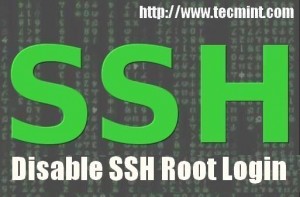Today, everyone knows that Linux systems comes with root user access and by default theroot access is enabled for outside world. For security reason it’s not a good idea to have sshroot access enabled for unauthorized users. Because any hacker can try to brute force your password and gain access to your system.
So, its better to have another account that you regularly use and then switch to root user by using ‘su -‘ command when necessary. Before we start, make sure you have a regular user account and with that you su or sudo to gain root access.
In Linux, it’s very easy to create separate account, login as root user and simply run the ‘adduser‘ command to create separate user. Once user is created, just follow the below steps to disable root login via SSH.
We use sshd master configuration file to disable root login and this will may decrease and prevent the hacker from gaining root access to your Linux box. We also see how to enableroot access again as well as how to limit ssh access based on users list.
Disable SSH Root Login
To disable root login, open the main ssh configuration file /etc/ssh/sshd_config with your choice of editor.
# vi /etc/ssh/sshd_config
Search for the following line in the file.
#PermitRootLogin no
Remove the ‘#‘ from the beginning of the line. Make the line look like similar to this.
PermitRootLogin no
Next, we need to restart the SSH daemon service.
# /etc/init.d/sshd restart
Now try to login with root user, you will get “Access Denied” error.
login as: root
Access denied
root@172.31.41.51's password:
So, from now onwards login as normal user and then use ‘su’ command to switch to root user.
login as: tecmint
Access denied
tecmint@172.16.25.126's password:
Last login: Tue Oct 16 17:37:56 2012 from 172.16.25.125
[tecmint@tecmint ~]$ su -
Password:
[root@tecmint ~]#
Enable SSH Root Login
To enable ssh root logging, open the file /etc/ssh/sshd_config.
# vi /etc/ssh/sshd_config
Search for the following line and put the ‘#‘ at the beginning and save the file.
# PermitRootLogin no
Restart the sshd service.
# /etc/init.d/sshd restart
Now try to login with root user.
login as: root
Access denied
root@172.16.25.126's password:
Last login: Tue Nov 20 16:51:41 2012 from 172.16.25.125
[root@tecmint ~]#
Limit SSH User Logins
If you have large number of user accounts on the systems, then it makes sense that we limit remote access to those users who really need it. Open the /etc/ssh/sshd_config file.
# vi /etc/ssh/sshd_config
Add an AllowUsers line at the bottom of the file with a space separated by list of usernames. For example, user tecmint and sheena both have access to remote ssh.
AllowUsers tecmint sheena
Now restart ssh service.























 5万+
5万+

 被折叠的 条评论
为什么被折叠?
被折叠的 条评论
为什么被折叠?








